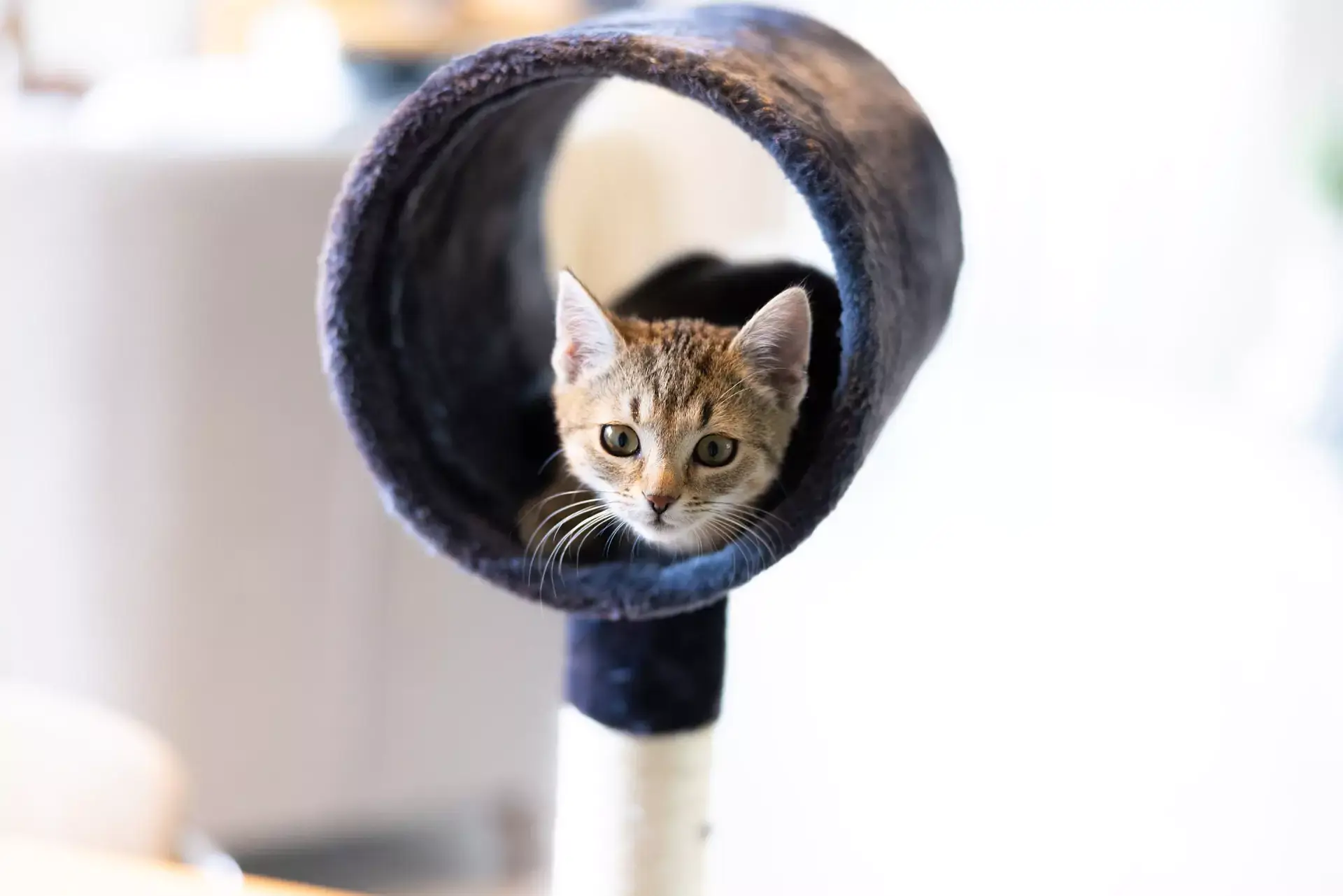Comforting a stressed cat becomes critical when your feline shows signs such as hiding, reduced appetite, or sudden aggression. Evidence suggests stress in cats can stem from abrupt environment changes, unfamiliar houseguests, or underlying health issues. Learning to spot stress signs, like excessive grooming, can help. Providing a soothing space with familiar bedding and toys helps your cat feel more secure. Slow, steady movements and gentle interaction let them know they’re safe. Experts recommend checking for medical causes if stress persists. By maintaining a routine and respecting your cat’s personal boundaries, you encourage trust and emotional stability. Consistency in feeding times, play schedules, and quiet time helps reduce anxiety. Keep the environment calm by limiting loud noises and creating cozy hiding spots. Ultimately, understanding your cat’s unique signals is key to easing tension. Through gradual exposure to triggers and reassurance, you set the foundation for a happier, more relaxed companion.
Have you got an anxious cat? All of our feline buddies are distinctively unique. Some kitties are courageous and fearless, some are sociable and outgoing, and some are very shy and anxious. If you have a stressed-out cat, continue reading! In this story, a Guelph, ON veterinarian shares ideas on how to help Fluffy thrive.
Create A Safe And Comfortable Environment For Fluffy
Kitties are both natural predators and prey in the wild. This could be one of the reasons for their unique blend of characteristics. Fluffy can be extremely brave when pursuing the small red dot, but she may be scared of the vacuum, and may bolt for her favorite hiding spot the moment a guest shows up.
When dealing with shy pets, providing a secure environment is very important. Make sure your nervous little buddy has lots of hiding spots. Paper grocery bags without handles may be enticing hideouts for anxious cats. Fluffy would probably appreciate an enclosed cat condo. Boxes are also popular with timid felines.
Adopting a Shy Cat
Do you want to get a new cat? We love seeing anxious cats get loving forever homes. However, choosing a kitty that will fit into your family is really important. A nervous cat may feel overwhelmed if you have a hyperactive dog, a young child, and three other cats.
Helping your anxious kitty begins the moment you bring your feline partner home. Make sure she is in a peaceful and comfortable environment. Start her out in a quiet, private spot. An extra room is an excellent choice. If you and Fluffy live alone, keep the door open and let her explore when she’s ready.
Pet-calming products, such as treats or sprays, can help your cat relax as she is settling in. Ask your vet for advice on this. Also, be sure to follow package directions to the letter. You can also play Fluffy some relaxing music or show her cat TV.
When your pet is ready to explore a bit, try sitting on the floor and gently beckoning her with a treat. (The ‘pssst’ sound might also work.) Don’t worry if she does not approach right away. When she is brave enough to come up to you, let her smell your fingers. Next, give her a reward, such as a bit of cooked, boneless fish or chicken. You can try to delicately stroke her forehead.
If you have more pets, introduce them gradually. Consult your veterinarian for guidance on this.
To effectively bond with your cat, it’s helpful to understand how to comfort a stressed cat. One guideline is to give Fluffy the autonomy to decide when she wants attention or cuddling. By letting her come to you on her own terms, you reinforce her sense of security and control.
You don’t want to demand attention, but you shouldn’t ignore your pet either. Talk to Fluffy, check on her, and offer toys, food, catnip, and, of course, lap space. Reading to your pet may also help. Fluffy will grow accustomed to the sound of your voice and begin to feel safe. If you have kids, this is something they can do as well.
Boosting Kitty’s Confidence
Did you know that playing with a timid cat is one of the best things you can do for her? All felines have a natural hunting instinct. Even the most shy kitty will probably be pretty enticed by a feather on a string or a catnip mouse. Your furry pal will feel better about herself once she has mastered that tricky pounce/roll/meow combo. Consider it the feline version of completing a hard task or acing a test.
Furthermore, playing offers your pet a safe and healthy approach to working off any stress she is feeling. Exercise can be incredibly beneficial to both humans and pets in this regard. This will help Fluffy burn off some of that nervous energy. She’ll be a little more relaxed afterward because she’ll be tired.
Make sure your little pal has a selection of intriguing toys. Cats have a wide range of plaything preferences, so you may need to experiment and try a few various items before determining what she prefers.
Fluffy may also like a cat tower. Choose a cat with at least one enclosed level. Kitties may feel safer in higher places, so choose one she can climb.
We also recommend sticking with a steady mealtime and playtime routine. Kitties are definitely creatures of habit. Many of our animal companions just feel more secure when they are kept on a regular schedule. (Your pet will set her own napping agenda.)
Take Fluffy To The Veterinarian
We always suggest that when people adopt a new cat, they take Fluffy to the veterinarian as soon as possible for a complete examination. This is especially true for timid kittens. You want to rule out the potential that a medical problem is causing your little friend’s stress. If your feline partner gets the all-clear, you’ll know she’s anxious, rather than unwell. If your kitty is really stressed, your Guelph, ON veterinarian may prescribe medication.
What Shouldn’t You Do with Stressed-Out Cats?
When comforting a stressed cat, it’s important to avoid some common mistakes. Foremost, do not let your cat go outside. A shy cat would probably bolt and seek refuge, making it difficult to persuade her to return. Cats are also safer indoors, where they are protected from traffic, the elements, and wild animals.
As previously indicated, never force attention on Fluffy. If she refuses to be held or picked up, let her go. Forcing her may backfire, making her nervous and fearful of you. It takes time to build trust.
Determine The Root Cause Of Your Pet’s Anxiety
While some cats are innately skittish, stress is usually caused by something. You must determine what is causing your cat’s distress. Kitties are highly emotional and might become very terrified or upset.
Here are some things that often upset our feline friends:
- Disease
- Visitors
- Change In Household Occupants
- Construction/Environment Changes
- New Furniture
- New Babies
- Kitty Drama
- Separation Anxiety
- Boredom
- Loneliness
- Travel
- Conflict With Other Pets
- Competition Over Resources
- Cats Outside The House
- Improper Socialization
- Insufficient Scratching Posts
- Discomfort
- Past Trauma
- Moving To A New Home
- Veterinary Visits
- Routine Changes
- New Pets
- Loud Noises
Figuring out what the issue is can be very helpful, as this will also inform the tactic you need to take. For example, if the issue is conflict with another household pet, you may need to set out additional resources, such as an extra litterbox.
Ask your Guelph, ON veterinarian for specific advice.
Time, Love, And Patience
Once the root issue has been resolved, you may very well see your furry pal starting to relax a bit. However, keep in mind that your kitty may never be that friendly cat that hops onto guests’ laps or meows at your sister or parents when they visit. That’s fine! Also, be patient. It may take some time to start that little motor, but the passionate purrs and cuddles will be even more important once you do. It’s amazing how much of a difference time, love, and good care can make.
Comforting a Stressed Cat in 2025: Effective Pheromones, Supplements, and Interaction Tips
What pheromone products can help with cat anxiety?
Feline-specific synthetic pheromone products, such as Feliway, replicate natural facial pheromones that cats release when they feel calm and secure. Research indicates that these sprays and diffusers can help reduce stress-related behaviors, including spraying or hiding, particularly in multi-cat or unfamiliar environments. Used consistently, they create a more peaceful atmosphere and encourage positive associations. For best results, place diffusers where cats spend most of their time and follow all instructions carefully. These products can also work well alongside environmental modifications and behavioral strategies. Seek veterinary guidance for personalized recommendations.
What supplements or nutraceuticals can reduce anxious behaviors in cats?
L-theanine, an amino acid derived from green tea, may foster a calmer mood in cats. Alpha-casozepine, commonly found in products like Zylkene, is obtained from milk proteins and can support relaxation. Tryptophan, a precursor to serotonin, has also been linked to easing signs of stress. Omega-3 fatty acids from fish oil may balance behavior and reduce anxiety-related inflammation. Botanical extracts such as chamomile or lavender may help soothe anxious reactions when administered under veterinary supervision. All supplement decisions should be reviewed with a professional, as each cat’s requirements and responses can vary.
What specific types of music or sounds can help calm cats?
Soft, slow-tempo classical compositions or specially designed “cat music” featuring gentle tempos, purring elements, or birdlike chirps can often encourage relaxation. Research suggests that mellow instrumental melodies, particularly harp or piano arrangements, help reduce feline anxiety by imitating comforting feline vocalizations. Nature sounds like gentle rainfall, ocean waves, or rustling leaves can also contribute to a peaceful atmosphere. Moderate volume and minimal sudden changes are recommended, as abrupt shifts may startle sensitive listeners. Observing each cat’s response and adjusting selections accordingly fosters a serene environment for relaxation and stress relief.
Why might white noise machines help (or potentially harm) stressed cats?
White noise machines produce a steady sound that can mask sudden noises, potentially soothing anxious cats by providing a consistent audio environment. This may be particularly helpful in homes with frequent commotion or loud noises. Some cats find this continuous background noise calming, which may reduce stress-related behaviors. However, individual sensitivity varies. Certain felines may be unsettled by new or unfamiliar tones, causing increased anxiety. Observing a cat’s reaction to volume levels and frequency is recommended. When used thoughtfully, these devices might support relaxation while minimizing triggers that disturb nervous pets.
How should visitors be instructed to interact with anxious cats?
Visitors can help anxious cats feel at ease by granting them space and allowing them to decide when to interact. Greeting these felines softly, without making sudden gestures or loud noises, fosters a calmer environment. Offering treats can motivate a shy cat to approach, while avoiding forced handling prevents heightened stress. If the cat chooses to hide, it should not be disturbed. Patience and gentle engagement create trust, as does speaking in low, soothing tones. Gradual, respectful interactions support a feline’s sense of security and comfort. Consistent, calm behavior encourages anxious pets to build positive associations with visitors.
Visit Our Guelph, ON Animal Clinic
Do you have to bring your pet in for an examination? Have you lately adopted a cat who is anxious? Contact your Guelph, ON pet hospital immediately now.






!Social Media Icons